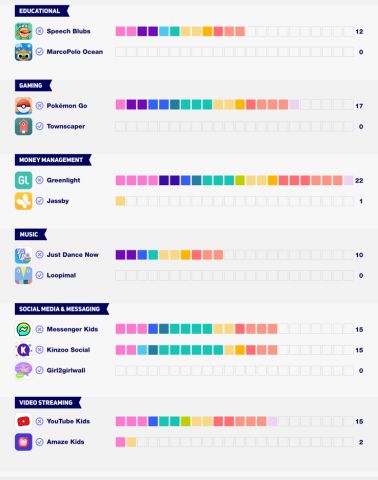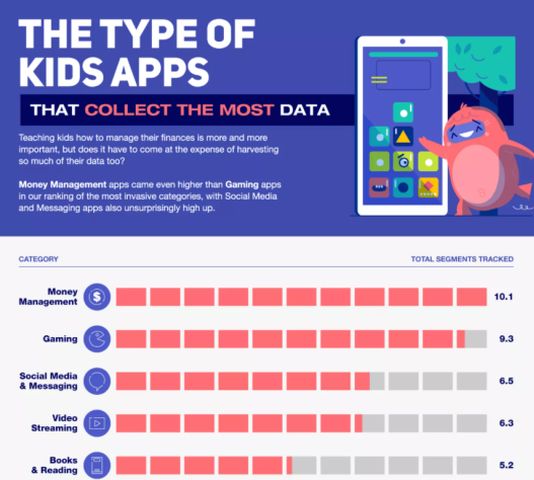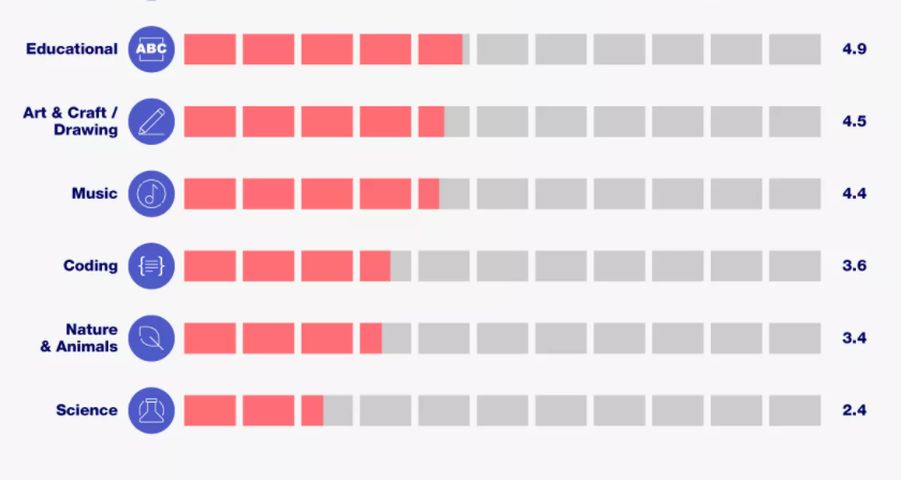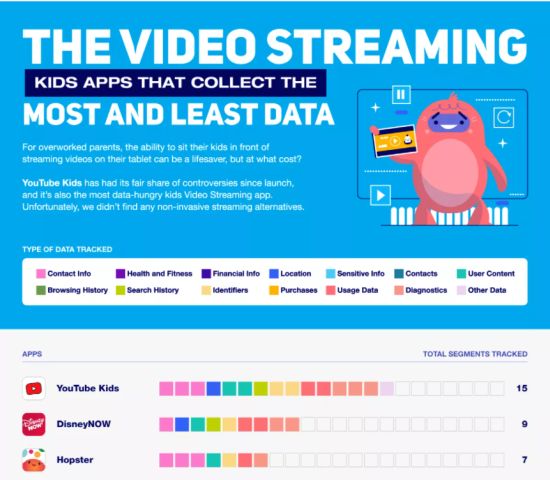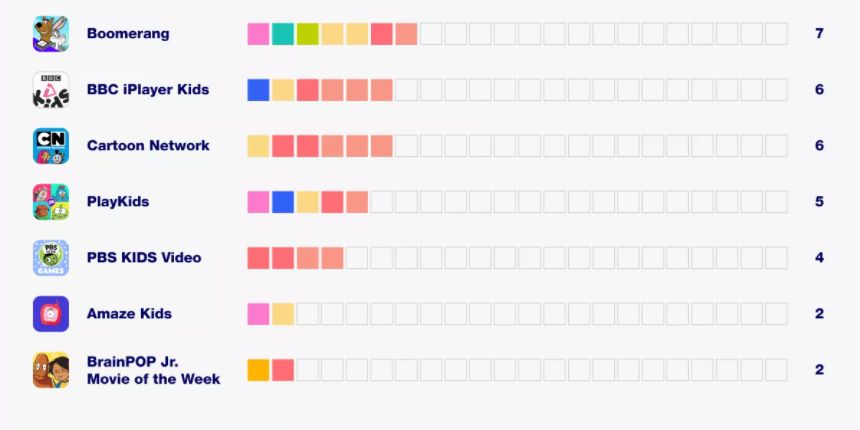As a parent, you’ve probably worried about how much time your kids spend online — and what they’re doing with that time. From utilizing parental controls to limiting screen time and social media access, there are plenty of things you can do to ensure your child stays safe and doesn’t spend their entire life in front of a phone, tablet, or computer screen.
But there’s a hidden risk out there that many of us don’t consider. A recent study by the Pew Research Center revealed that, by the age of eight, 81% of children in America use a tablet. Whether your kids are gaming, messaging friends, browsing social media, or watching videos, they’re using apps on a daily basis. Many of the most popular kids apps are collecting data constantly, but how much are they learning about our children? We take a look at which kids apps collect the most data, and how you can protect your children’s privacy.
This article is all about apps for kids, but you can also find out which apps share your data the most.
What data do kids apps collect, and why?

A study by the Berkley-affiliated International Computer Science Institute looked at thousands of free apps for kids in the Google Play Store. Results revealed that almost a fifth of the kids apps studied collected “personally identifiable information” (such as name, biometrics, birthday), doing so by using “third-party software development kits (SDKs) that were not supposed to be used in child-directed apps.” Around 5% of the apps harvested contact or location data without parental consent, and, worryingly, many apps also transmitted data insecurely. Here are just a few different types of data that kids apps could be harvesting on your child:
- Contact information
- Search and browsing history
- Location
- Financial information
- Contacts
- User content
- Usage data
- Diagnostics
- Identifiers
- Purchases
Many developers surveyed feigned ignorance that children used their apps. Others claimed that their apps weren’t specifically marketed to children, despite this being obviously untrue.
Why are kids’ apps collecting data?
But why is kids’ data so valuable, and why are app developers harvesting it? Under the Children’s Online Privacy Protection Act (COPPA), app developers must take steps to protect the data of children under 13 using their apps. If developers are using third-party software to collect user data without consent — something that happens more often than you might think, and is often caused by misconfigured settings — they could be breaking the law. A study carried out by Compareitech revealed that around 20% of the top 500 Android apps for kids in the Google Play Store collect data that likely breaches COPPA regulations.
In-app purchases aside, many free apps make money by selling personal data to ad networks. Games can analyze a child’s gaming habits and use this information to deliver precisely targeted adverts for their next game, for example. Video sharing apps (like YouTube) can collect search and viewing history to deliver recommended adverts and videos. Even educational games aren’t exempt from collecting (and sharing) children’s data.
Which apps are the most data-hungry?
In January 2022, The ToyZone carried out a study to analyze the privacy policies of the top 100+ kids apps to see how much data they’re really collecting. The tables above show the top 10 most data-hungry apps overall across a range of categories. Coming out on top is Greenlight Kids and Teen Banking, which collects a whopping 22 different types of data from children, including three types of “usage data” plus location information.
Perhaps surprisingly, the next worst offender was the popular AR game Pokemon Go, which collects 17 different types of data including contact information, location, identifiers, and more. In contrast, games like Townscape and educational apps like MarcoPolo Ocean don’t collect any data at all.
Which categories of kids apps collect the most data?
Looking at the table, it’s easy to see that some categories of apps for kids are more data-hungry than others. The study results revealed that money management apps were the worst offenders when it came to collecting children’s data, with the average app collecting 10.1 segment types. Gaming apps, social media and messaging apps, and video streaming apps weren’t far behind. The types of apps collecting the least data on kids included science apps (with just 2.4 data segments), nature and animals apps, and coding. Let’s take a deeper look at some of the worst offending categories.
Gaming apps
As adults, we’re used to seeing ads in free games, but in children’s games, those ads could be specifically targeted to encourage kids to buy a new game or make an in-app purchase. In the gaming category, Pokemon Go, as we’ve already mentioned, is the worst offender, and considering the developer has a new AR bitcoin hunting game out, it’s easy to see why collecting data on kids gaming habits could be dangerous. Other popular games that collected the most data included Animal Jam (16), Roblox (15), and Animal Crossing: Pocket Camp (13). This data ranged from contact information to purchases, identifiers, and search history.
Social media and messaging apps
When it comes to social media and messaging, many parents are — quite rightly — worried about their children spending time unsupervised on these apps. It comes as no surprise that Facebook Messenger Kids collects the most data on children — 15 different types, in fact. Kinzoo Social and Fennec Messenger weren’t far behind. If you don’t want apps collecting your kids data, Girl2GirlWall and Edmodo were the only two apps that collect zero data.
Video streaming apps
You’d think that video streaming apps like YouTube wouldn’t need to harvest much data from you. But perhaps surprisingly, none of the video streaming apps in the study collected zero data. YouTube came out top, collecting 15 different types of data including identifiers, search history, and location. YouTube paid $170 million in 2019 to settle allegations about collecting personal data on kids. However, it claims it does so in order to make recommendations rather than using this data for targeted ads. DisneyNOW and Hopster came second and third, collecting nine and seven types of data respectively.
Educational apps
As parents, it’s easy to assume that educational apps are a safe place for your child to grow and learn. But lots of popular educational apps are collecting data on children, like Speech Blubs: Language Therapy, which collects 12 different types of user data, or Pictowrd, which gathers user content, identifiers, usage data, purchases, and more: nine different segments of data in all. In the study, only Easy Dyslexia Aid and MarcoPolo Ocean collected no data at all.
Protecting kids online privacy

Seeing just how much of our kids’ data popular apps are collecting can be eye-opening, and for most of us, it’s not something we’ve ever really considered. Luckily, there are a few steps you can take to protect your kids from data-hungry apps.
- Ensure that you only download apps from reputable stores (like the Google Play Store) that have a child protection policy in place.
- Install and use parental controls, particularly suitable for younger children using a tablet or phone.
- Adjust privacy settings on apps after installing them, as well as new browsers and websites.
- Stay informed by reading articles like this one, as well as studies looking into which apps are the most invasive.
It’s also a good idea to have a frank discussion with your kids about how valuable a commodity their personal data is so that they understand the need to protect themselves.

